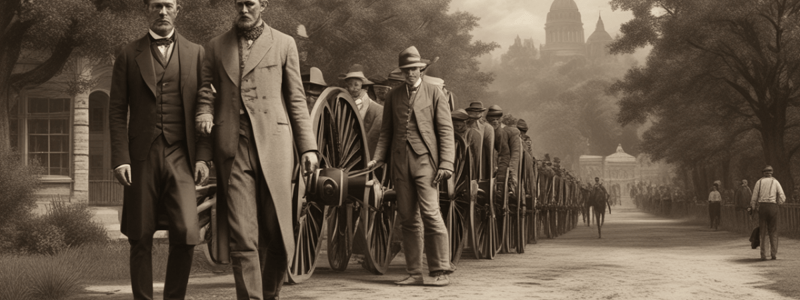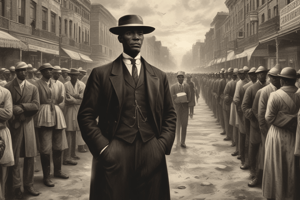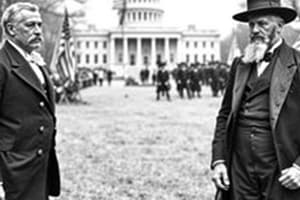Podcast
Questions and Answers
What was the impact of the Freedmen's Bureau on African Americans during the Reconstruction era?
What was the impact of the Freedmen's Bureau on African Americans during the Reconstruction era?
- It limited their access to education and healthcare.
- It provided assistance in education, healthcare, and employment. (correct)
- It led to their widespread disenfranchisement and segregation.
- It had no significant impact on their lives.
What was the primary failure of the South's rebuilding efforts after the Civil War?
What was the primary failure of the South's rebuilding efforts after the Civil War?
- Inability to revitalize its economy and integrate back into the Union.
- Economic stagnation and lack of industrialization.
- Inability to rebuild its infrastructure and transportation networks.
- Failure to address deep-seated social and racial issues. (correct)
What was the significance of the establishment of public education systems in the South during the late 19th and early 20th centuries?
What was the significance of the establishment of public education systems in the South during the late 19th and early 20th centuries?
- It had no impact on the region's modernization.
- It led to the erosion of social and racial inequalities.
- It hindered economic growth and development.
- It marked a significant step towards improving literacy and education in the region. (correct)
What was the impact of Jim Crow laws on African Americans?
What was the impact of Jim Crow laws on African Americans?
What was the outcome of the South's reliance on sharecropping and tenant farming?
What was the outcome of the South's reliance on sharecropping and tenant farming?
What was the significance of the railroads in the South's rebuilding efforts?
What was the significance of the railroads in the South's rebuilding efforts?
What was the outcome of the South's failure to address social and racial issues?
What was the outcome of the South's failure to address social and racial issues?
What was the impact of the South's rebuilding efforts on African Americans?
What was the impact of the South's rebuilding efforts on African Americans?
What was the significance of industrialization in the South's rebuilding efforts?
What was the significance of industrialization in the South's rebuilding efforts?
What was the outcome of the South's failure to diversify its economy?
What was the outcome of the South's failure to diversify its economy?
What was the primary purpose of the Freedmen's Bureau established in 1865?
What was the primary purpose of the Freedmen's Bureau established in 1865?
Which Amendment granted citizenship and equal protection under the law to all persons born or naturalized in the U.S.?
Which Amendment granted citizenship and equal protection under the law to all persons born or naturalized in the U.S.?
What was the main outcome of the Plessy vs. Ferguson case in 1896?
What was the main outcome of the Plessy vs. Ferguson case in 1896?
What was the primary purpose of the Black Codes passed by Southern states after the Civil War?
What was the primary purpose of the Black Codes passed by Southern states after the Civil War?
What was the outcome of the Compromise of 1877?
What was the outcome of the Compromise of 1877?
What was the primary purpose of the Jim Crow Laws?
What was the primary purpose of the Jim Crow Laws?
What was the result of the 13th Amendment in 1865?
What was the result of the 13th Amendment in 1865?
What was the primary purpose of sharecropping?
What was the primary purpose of sharecropping?
What was the primary motivation for the United States' westward expansion in the 19th century?
What was the primary motivation for the United States' westward expansion in the 19th century?
What were the main consequences of westward expansion for Native American communities?
What were the main consequences of westward expansion for Native American communities?
What was the primary economic difference between the North and South in the mid-19th century?
What was the primary economic difference between the North and South in the mid-19th century?
What was the main issue dividing the North and South leading to the Civil War?
What was the main issue dividing the North and South leading to the Civil War?
What was the outcome of the various compromises attempted to resolve the conflicts between the North and South?
What was the outcome of the various compromises attempted to resolve the conflicts between the North and South?
What was the immediate trigger leading to the secession of Southern states and the outbreak of the Civil War?
What was the immediate trigger leading to the secession of Southern states and the outbreak of the Civil War?
What was the result of the westward expansion on the growth of American nationalism?
What was the result of the westward expansion on the growth of American nationalism?
What was the main reason why the North advocated for the restriction or abolition of slavery?
What was the main reason why the North advocated for the restriction or abolition of slavery?
What was the significance of the Louisiana Purchase of 1803 in the context of westward expansion?
What was the significance of the Louisiana Purchase of 1803 in the context of westward expansion?
What was the result of the territorial conflicts between the North and South?
What was the result of the territorial conflicts between the North and South?
Flashcards are hidden until you start studying
Study Notes
Reconstruction of the United States
- The Freedmen's Bureau was established in 1865 to help formerly enslaved African Americans and poor whites in the South with food, housing, education, and employment.
- The Reconstruction Amendments consisted of the 13th Amendment (abolishing slavery in 1865), the 14th Amendment (granting citizenship and equal protection under the law to all persons born or naturalized in the U.S. in 1868), and the 15th Amendment (prohibiting the denial of voting rights based on race, color, or previous condition of servitude in 1870).
- Sharecropping was a system where landless farmers (often African Americans) worked on land owned by others in exchange for a share of the crops produced.
- Black Codes were laws passed by Southern states after the Civil War to restrict the freedom of African Americans and ensure a stable labor supply.
- Poll Taxes and Literacy Tests were used to disenfranchise African Americans.
- Jim Crow Laws were state and local laws enforcing racial segregation in the Southern United States.
- Segregation was the separation of people based on race, ethnicity, religion, or other characteristics.
- The Plessy vs. Ferguson case in 1896 upheld the constitutionality of racial segregation under the 'separate but equal' doctrine.
- The Compromise of 1877 was an informal agreement that ended the Reconstruction era, resulting in the withdrawal of federal troops from the South and the election of Rutherford B. Hayes as President.
Changes in African Americans' Lives after the Civil War
- The abolition of slavery in 1865 legally freed millions of African Americans.
- African Americans made strides in political representation, with several holding public office for the first time.
- The establishment of institutions like the Freedmen's Bureau provided assistance in education, healthcare, and employment.
- However, the end of Reconstruction and the rise of Jim Crow laws in the late 19th century led to widespread disenfranchisement and segregation, severely limiting economic and social opportunities.
Rebuilding Efforts in the South
- The South was successful in rebuilding its infrastructure, revitalizing its economy, and integrating back into the Union.
- Railroads, cities, and agricultural systems were reconstructed, and new industries began to emerge.
- However, the South was largely unsuccessful in addressing the deep-seated social and racial issues that plagued the region.
- The implementation of Jim Crow laws institutionalized racial segregation and disenfranchised African Americans, undermining the social progress that could have been achieved.
- The reliance on sharecropping and tenant farming kept many African Americans and poor whites in a cycle of poverty and dependency.
Westward Expansion
- The Louisiana Purchase of 1803, the annexation of Texas in 1845, and the acquisition of Oregon and California through treaties and conflicts significantly increased the United States' landmass.
- Economic opportunities, such as the discovery of gold in California in 1848, the promise of fertile land for farming, and the potential for trade and commerce, attracted settlers westward.
- The belief in Manifest Destiny, the idea that Americans were divinely ordained to expand across the continent, provided ideological justification for this expansion.
- However, westward expansion had devastating impacts on Native American communities, leading to displacement, loss of ancestral lands, and violent conflicts.
Factors Leading to the Civil War
- The Civil War was precipitated by deep-seated social, economic, and political tensions between the North and South.
- The North's economy, increasingly industrial and urban, contrasted sharply with the South's agrarian economy, which was heavily dependent on slave labor for its cotton production.
- The issue of slavery was the most contentious, with the North advocating for its restriction or abolition and the South insisting on its expansion into new territories.
- States' rights further complicated matters, as Southern states championed the idea that they had the authority to nullify federal laws and secede from the Union if their interests were threatened.
- Various compromises, such as the Missouri Compromise and the Compromise of 1850, attempted to balance these opposing interests but only provided temporary solutions.
Studying That Suits You
Use AI to generate personalized quizzes and flashcards to suit your learning preferences.




